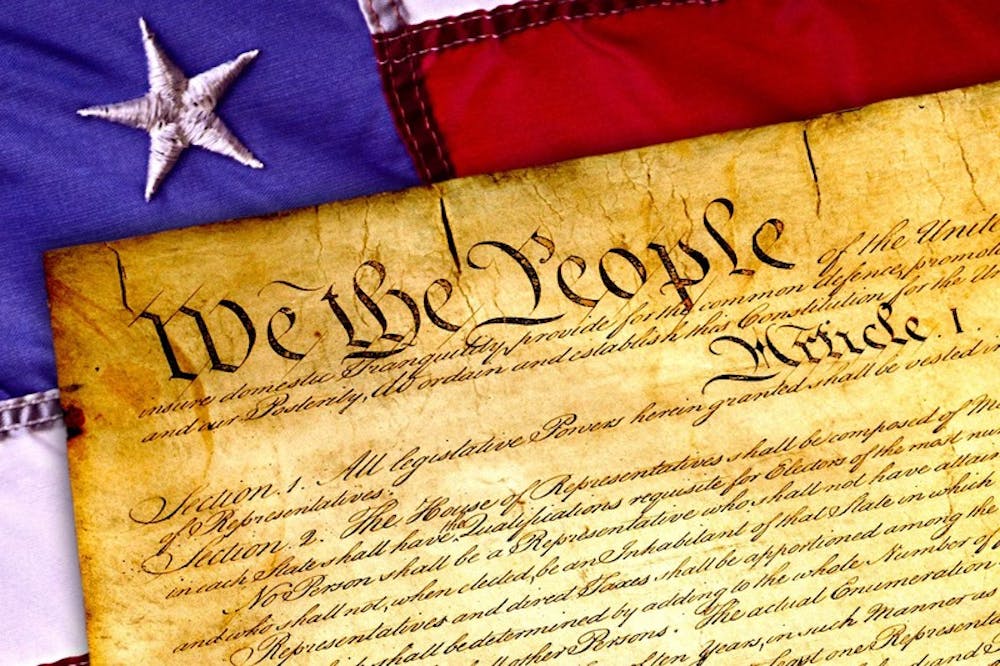Once per year, on Sept. 17, the United States quietly marks what might be its most underrated holiday. No, I don’t mean International Country Music Day (though I’ll admit that I was looking forward to that for weeks). I’m talking about the commemoration of the document that lies at the core of our national identity: the Constitution of the United States.
This year, as tends to be the norm, the anniversary of the Constitution’s signing slipped by without much notice. I didn’t see a single reference to it on Instagram or Facebook, and only the most enthusiastic political commentators marked the occasion on Twitter. It’s worrying enough that our country seems to all but forget about Constitution Day, but there’s something that scares me far more — the purposeful, consistent disregard that our current president displays towards our founding document.
Let’s get something straight — our government has weathered political storms before. Its structure, spelled out in the Constitution, has built-in features intended to protect its long-term integrity against short-term threats. Anybody who has taken an introductory course in American politics will remember that we have a system of checks and balances. Through that system, each of the three branches of our government can monitor and moderate the actions of the other two. Those branches exist because our government is one of separated powers — another safety feature. In the 232 years since the Founders signed off on this construction, the fundamental structure of our government has remained relatively unchanged.
Though our Constitution is revered worldwide for its protection of individual liberties and its establishment of a stable, accountable government, it is far from invincible. As countries like Turkey, Venezuela and Hungary have recently learned, there is only a thin line between a functional, secure liberal democracy and a consolidated single-party state. Surely, though, our Constitution is different. Surely, we could never allow a single leader to consolidate the powers of the United States government for himself?
Let’s close our eyes and imagine what such a consolidation of power might look like if it were to happen here. Where would a future American dictator start?
He would first want to ensure his popular support. Securing electoral victories is necessary in the first years of a dictator’s reign, because structural changes to democratic systems take time. He could try to solidify a political base by discrediting the free press (who might write stories that turn some voters against him), by depicting himself as the only one who can save his people from some existential threat or by challenging the legitimacy of electoral outcomes.
But popular support might not be enough. What if our federal court system tried to strike down his anti-democratic policies? A dictator’s response would be to get ahead of the curve — to ensure that the judicial branch is full of friendly judges willing to uphold anything he supported. When that wasn’t possible, our theoretical villain might try to discredit the courts by belittling and slandering their judges or by simply ignoring their rulings.
Still, though, what about Congress? Doesn’t our Constitution give them some tools to reign in a powerful executive? You’re right — Article I Section II gives the House of Representatives the ability to formally charge the president with wrongdoing in office and to seek his removal. The U.S. Senate, meanwhile, is charged with carrying out the actual impeachment trial itself. Knowing that Congress thus has the ability to end his hold on power altogether, an aspiring American dictator would seek to ensure the absolute loyalty of House and Senate leadership, and would tolerate no deviance.
All of these steps would enable a potential American dictator to expand the power of his presidential office beyond anything the Founders could have foreseen, essentially bypassing the limits of the Constitution and creating in their place a full-fledged dictatorship. He could use his influence to target his political opponents, to challenge unfriendly news outlets, or to undermine the legitimacy of opposing political parties.
Sound familiar?
Our Constitution is inherently flawed — and that’s why it needs protecting. Though historically it has enabled evils like slavery, segregation and political imprisonment of American citizens, it remains the best tool we have for maintaining a stable, accountable government. Its built-in flexibility has allowed it to adjust to the changing norms of American society over time, all the while ensuring that no single branch of our federal government could overpower the other two. For all of its failings, it has never yielded to a dictatorial President — at least, not yet.
With all that said, if you missed Constitution Day this year, you’re in luck! Defending the integrity of our democracy isn’t a one-day job. It doesn’t take much for the American people (you included) to prevent the hypothetical consolidation of power that I described. We still have an independent press, so write letters to the editor! We still have elections, so get educated on the candidates! If you can vote, do so — and if you can’t, tell others about your favorite candidate!
Protecting our Constitution against existential threats is something that everyone can do. As we mark Constitution Day, let’s not forget just how fragile it really is.
Tim Shade is a junior from Baltimore studying Political Science and International Studies.





